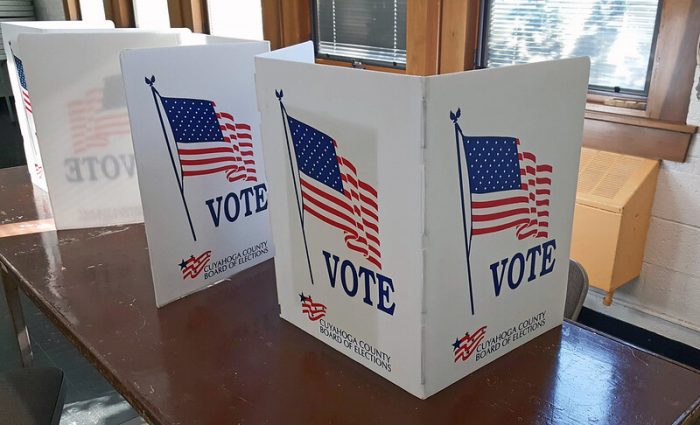
In the year since the January 6 insurrection at the U.S. Capitol, there’s been a renewed focus on how news coverage has contributed to the overall political divide in the nation. And, yes, that includes the media’s culpability in the erosion of democracy.
I say renewed because this is not a new debate. Every time there’s a particularly noticeable decline in civic discourse — prompted, to cite just a few examples, by the social upheavals of the 60s, the cynicism of the Watergate era, post-9/11 jingoism, and now the tilt away from democratic principles — there’s a new round of navel-gazing over what we in the media could have done better.
The problem is, it rarely results in productive reform. After a cycle of finger-pointing and self-flagellation, political coverage always bounces back to being centered in polls, rallies, sound bites, and hot takes.Here at KPCC/LAist we’ve decided to refocus the lens of our political coverage. We’re rebranding what has traditionally been known as the politics beat. It’s best explained by our job posting for what will now be known as the Civics and Democracy beat:
Democracy in America is at its greatest risk of failure since the Civil War. Misinformation is rampant, political opponents are treating one another as mortal enemies, and many voters are either enraged or disengaged. As we approach the midterm elections, readers and listeners will need reliable information on the state of our democracy and how they can be active in keeping our political system from collapsing.
Southern California Public Radio, 89.3 KPCC and LAist.com is seeking a Senior Reporter who will be charged with developing a beat that looks at what’s eroding the underpinnings of our democratic processes and elevates the voices of voters. This reporter will examine who gets listened to, and why, and provide a guide to anyone who wants to more fully participate in civic life.
This role is responsible for reshaping how we cover the political landscape. What are the hurdles to getting involved? What are the issues at stake? We are not interested in disseminating divisive political party talking points, typical horse-race style election and political coverage, or an institutional-based focus. We are interested in reflecting how elections matter for our region and our civic life. That said, this role will keep up with the political news of the day and be ready to appear as a regular expert guest on KPCC broadcasts.
TL;DR version: We’re tired of politics as usual, and we’re tired of political coverage as usual. We need a reporter who’s more interested in helping regular people than worrying about what their sources and politicians think.
So much political coverage today is focused on who’s shouting the loudest or spewing the most outrageous nonsense. We’re more concerned about who’s mostly silent. That’s not just the voters who have lost faith in or become exhausted by what passes for politics these days but also who’s quietly funding messaging that’s designed to distract the public from nefarious power grabs.
Here’s what we will do to help restore that faith. We’ll start with some of the basics: Our reporter will be teamed up with an engagement producer, who will provide guides to local government structures (in other words, who’s responsible for what), how and where to vote, who the candidates are, and other practical information.
Make no mistake; this is not a soft beat. This reporter will hold government responsible. And, maybe even more important, this pivot will equip our audience to also hold their elected officials accountable. Our goal is to reenergize demoralized readers and listeners who’ve given up on civic involvement amid all the vein-popping vitriol.
We won’t build our coverage on poll-gazing or punditry, even though we will still be paying attention to those factors. But we’re not interested in politicians or spin doctors telling us what “the American people” — whatever that means — want. We will ask that question ourselves.
How? By getting outside of City Hall and into the community. Covering politics from an institutional perspective can be a trap. Institutions make it easy to center coverage in their perspectives by setting up cozy press rooms and handing out press releases and issuing statements or posting provocative tweets. Do those kinds of stories drive website traffic? Sure. Do they advance civic engagement? Not often.
Perhaps now more than ever, fostering civic involvement and shining a light on anti-democratic shifts is crucial. Last year’s insurrection exposed the threats to our federal system, but there’s perhaps a greater threat at the local level. Studies have shown how the continuing loss of local news outlets has led to a less-informed public, and a less-informed public is more susceptible to misinformation.We can’t just sit back and wait for the national news organizations based in Washington and New York to shift their focus. It has to start locally to drive home the relevance of the threat. As our chief content officer Kristen Muller put it, “If newsroom leaders don’t have a plan to cover the ‘Big Lie’ locally, they must prioritize it as soon as possible.”
This will require a new mindset. We’ve been conditioned as journalists to believe that reframing traditional coverage means abdicating our standards or ethics. Buy-in will be difficult. We essentially need to deprogram ourselves if we’re going to break away from the herd.
That’s not an unprecedented task. At KPCC/LAist we’ve built a foundation in doing work that centers information in the needs of our audience. We’ve got a track record of content like “Make Al Care,” our Human Voter Guide, and our Voter Game Plan 2020 that has advanced our mission of promoting civic engagement. We’ve even created guides for just living your life in Southern California from the day-to–day to making it through the pandemic.
We’ll use that foundation to enhance our journalism as we move into this challenging chapter in our nation’s history.
Tony Marcano is managing editor at KPCC/LAist. This post originally ran as a Medium post.